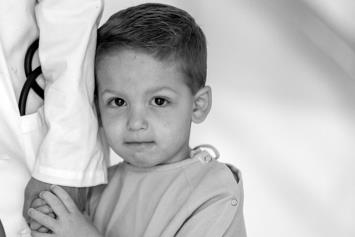Craniopharyngioma
It is a low-grade tumor, meaning it grows slowly and is not aggressive-appearing under the microscope.
What Is Craniopharyngioma?
Craniopharyngioma is a rare tumor that normally develops at the central, bottom portion of the brain. The pituitary gland, optic pathway and hypothalamus might be affected by this tumor. It is a low-grade tumor, meaning it grows slowly and is not aggressive-appearing under the microscope. There are about 150 children diagnosed with craniopharyngioma in the United States each year.
Craniopharyngiomas are classified into two subtypes:
- Adamantinomatous Craniopharyngioma: unevenly shaped tumors that normally have cysts (fluid-filled space) and areas of calcium build-up, makes up the majority of craniopharyngiomas in children
- Papillary Craniopharyngioma: solid tumors that are extremely rare in children
What Causes Craniopharyngioma?
There are no known environmental factors or genetic diseases that cause the tumor. Scientists believe that something is absent during normal development. Specifically, cells of the brain grow and divide as the body develops. During this cell division process, cells need to replicate their genetic material. Errors can take place during this process, leading to mutations (changes in gene structure), which may allow ependymal cells, the cells that line the brain and spinal cord, to grow into tumors. These errors generally occur randomly and cannot be prevented.
What Are the Signs and Symptoms?
Your child’s symptoms may vary depending on the size, extent, and location of the tumor.
If the tumor affects the optic nerve or optic pathway, vison problems such as partial blindness, double vision or narrowing field of vision may occur.
If the tumor affects the hypothalamus or pituitary gland, your child might show symptoms of hormonal (endocrine) imbalance. In this case, signs and symptoms can include:
- slowed growth
- excessive thirst and urination
- delayed puberty
- low energy
- weight gain
- changes in personality
Other symptoms of craniopharyngioma may include headaches (which may be worse in the morning), nausea, vomiting and trouble walking.
How Is Craniopharyngioma Diagnosed?
Your child's health care provider will ask about your child's health history and symptoms. In addition to a physical exam, the provider will also do a neurological exam to test reflexes, muscle strength, eye and mouth movement and coordination. Your doctor may refer your child to a cancer specialist (oncologist). Other tests that your child may need could include:
- CT Scan - A CT scan uses a series of X-rays and a computer to take pictures of the head or body. CT scans are very quick imaging, usually no more than a few minutes of scanning (though preparation may take longer).
- MRI - An MRI uses large magnets, radio waves and a computer to make detailed pictures of the body. Contrast dye may be injected into your child's vein to show a more detailed picture of the tumor. MRIs are very detailed imaging (provide much more information about the tumor), so take longer to perform (often 1-2 hours).
- Biopsy - Tumor cells are removed during surgery and sent to a lab for testing. This is done to find out the type of tumor (to finalize the tumor diagnosis) to determine how best to treat it and to understand how aggressive it is.
Your child’s doctor will also do endocrine and ophthalmic evaluations to look for hormone levels and any vison problems, respectively.
How Is Craniopharyngioma Treated?
Treatment involves surgery and possibly radiation therapy (high-energy x-rays used to kill or slow down tumor cells). The specific treatment plan will be individualized based on your child’s age and exact location, extent, and size of the tumor.
Children that have had their pituitary gland removed, injured, or involved due to the tumor have resulting hormonal (endocrine) imbalances that may require lifelong hormone replacement. A child may also have short- and long-term problems from the tumor or from treatment, which may include:
- Damage to the brain or nervous system that causes problems with coordination, muscle strength, speech or eyesight
- Complications after surgery, such as infection, bleeding and problems with general anesthesia
- Increased risk of infection and bleeding from chemotherapy
- Delayed growth and development
- Learning problems
- Problems with reproduction (infertility)
- Return of the cancer (recurrence)
- Increased risk for other cancers later in life
Speak with your child’s doctor about what you should watch for and what can be done to help prevent complications.
Survivorship – Outcomes and Life After Craniopharyngioma Treatment
Improving the quality of life of survivors of brain tumors is an area of much ongoing research and continued progress. Some patients have little to no long-term problems from their tumor or treatment, whereas other patients experience more significant side effects. Endocrinology issues can be common in patients with craniopharyngiomas. All patients will continue to be followed by the oncology team after finishing treatment to ensure they are doing well and to offer appropriate resources, therapies, and subspecialty team services as needed. Patients will also continue to get surveillance imaging (MRIs) to ensure their tumor does not grow back; as the time from end of treatment increases, these scans will be spaced further apart.
Why Choose Nationwide Children's?
The Neuro-Oncology Program at Nationwide Children’s Hospital offers clinical excellence in treating children, adolescents, and young adults with brain and spine tumors. Your child will have access to doctors who are experts in different types of medical care. We call this multidisciplinary care. Depending on the specific tumor diagnosis and treatment plan, your team may include oncologists, neurosurgeons, radiation oncologists, clinical psychologists, rehabilitation medicine doctors, neurologists, endocrinologists, ophthalmologists, therapists (physical, occupational, speech, art, music), social workers, dietitians and/or pharmacists. These team members all work together with the family to provide the best care for the patient.
Cancer Clinical Research
Nationwide Children’s is a national leader in oncology research and clinical trials. There are many ongoing research studies aimed at improving outcomes for children and young adults with brain/spine tumors—understanding why these tumors develop and how to appropriately target them. We are members of all major pediatric brain tumor clinical trial consortia including Pediatric Brain Tumor Consortium (PBTC), Collaborative Network of Neuro-oncology Clinical Trials (CONNECT), Pacific Neuro-oncology Consortium (PNOC) and the Children’s Oncology Group (COG). We have many open clinical trials testing new drugs in difficult-to-treat tumors, including in DIPG.
Next Steps
Speak With Our Team of Experts
Our team would be happy to answer any questions or schedule an appointment.
Request an Online Second Opinion
If you are currently receiving care at another institution and would like a second opinion from experts at Nationwide Children's, we can help.



